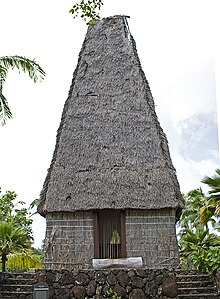Religion in Fiji (2007)[1]
According to the most recent census in 2007, most people have a Christian background (64.4% of the population), with a sizable Hindu (27.9%) and Muslim (6.3%) minority.[2] Religion tends to split along ethnic lines with most Indigenous Fijians being Christian and most Indo-Fijians being mostly Hindu or in some cases, Muslim.[3]
According to the World Religion Database, in 2020, Christians made up 63.91% of the population (mainly Protestant), 27.74% are Hindu and 6.2% are Muslims; 1% have no religion.[4]
Aboriginal Fijian religion could be classified in modern terms as forms of animism or shamanism, traditions utilizing various systems of divination which strongly affected every aspect of life. Fiji was Christianized in the 19th century. Today there are various Christian denominations in Fiji, the largest being the Methodist church. Hinduism and Islam arrived with the importation of large numbers of people from South Asia, most of them indentured, in the late 1800s and early 1900s.
Fiji has many public holidays as it acknowledges the special days held by the various belief systems, such as Easter and Christmas for the Christians, Diwali for the Hindus and the Eid al-Adha for the Muslims.[5]

- ^ "Population by Religion and Province of Enumeration". 2007 Census of Population. Fiji Bureau of Statistics. June 2012. Archived from the original on 9 September 2015. Retrieved 7 November 2015. - Percentages are derived from total population figures provided in the source
- ^ Cite error: The named reference
stat19962007was invoked but never defined (see the help page). - ^ US State Dept 2022 report
- ^ The ARDA website, retrieved 2023-08-03
- ^ "Fiji Government Online Portal - 2017 Fiji Public Holidays". www.fiji.gov.fj. Retrieved 5 August 2017.